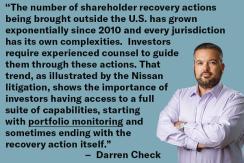In 2019, there were 428 securities class-action lawsuits filed in the U.S., each with the potential to have significant impact on investors and asset managers. Considering the years that such suits take to play out, at any moment there are thousands of them in motion just in the U.S. – far too many for asset managers to stay actively engaged to ensure their funds’ financial security, maximize value, and fulfill fiduciary obligations.
Not every class action takes place in the U.S., but with the right partner global asset managers have opportunities – and, in many cases, a duty – to pursue their funds’/clients’ claims both in the U.S. and in the growing number of non-U.S. class actions. This might sound overwhelming, but for overworked and under-resourced legal and operations there is a single-source solution. SecuritiesTracker is a secure and comprehensive platform combining portfolio monitoring, claims filing, legal analyses and recommendations, and case evaluations to guide fund managers to quickly determine how best to monetize claims and avoid leaving money on the table.

Asset recovery in Japan
One example of asset recovery outside the U.S. is now underway regarding the knock-on effects the Carlos Ghosn scandal had on investors’ portfolios. Kessler Topaz Meltzer & Check LLP is the organizer of the shareholder action in Japan against Nissan Motor Corp. Kessler Topaz has hired Japanese counsel and filed a complaint before the Tokyo District Court on behalf of institutional investors who purchased shares in Nissan between January 2011 and December 2019.
Such cases are extremely complex, but SecuritiesTracker platform identifies every shareholder related action that impacts your investment portfolio in jurisdictions around the globe. It also provides analysis of your options for pursuing claims and makes legal recommendations for how best to proceed. Once you’re engaged, the platform monitors the progress of all actions through resolution and disbursement of any recovery.
No doubt investors will be using SecuritiesTracker to keep up with progress in the Nissan shareholder action. The genesis of the case occurred with the scandalous arrest on November 19, 2018, of Carlos Ghosn, Nissan’s former chairman and CEO who was an alleged perpetrator of financial misconduct. Ghosn had famously driven the Renault-Nissan-Mitsubishi Alliance, a strategic partnership that effectively made the group the world’s largest light vehicle manufacturer.

A later internal investigation at Nissan found the Ghosn had underreported his compensation to the Japanese government and used company assets for personal purposes, however. Greg Kelly, Nissan’s first American director and its former head of human resources, was also arrested. What initially appeared to be a tale of misdeeds of company executives soon revealed that Nissan lacked the type of strong governance that investors depend on. An April 2019 report found that the company’s CEO and Ghosn’s successor, Hiroto Saikawa, signed off on documents related to the underreporting of Ghosn’s compensation and that the company had made multiple misrepresentations to shareholders, falsified documents, and held numerous board meetings that lasted only 20 minutes.
In September 2019, Nissan and Ghosn settled charges with the U.S. SEC. Nissan was fined $15 million and Ghosn was fined $1 million for taking steps to avoid disclosing more than $140 million in compensation that was paid to him.
In response to the reports of Ghosn’s initial arrest on November 19, 2018, Nissan’s stock price dropped 5.67%, and since that time his additional arrests and news about Nissan’s lack of effective internal controls have continued to impact its share price (including a drop of more than 20% between April and May 2019).
In December 2019, the Japanese Securities and Exchange Surveillance Commission (SESC) recommended that the Japanese Financial Services Agency issue an administrative penalty against Nissan for approximately JPY2.5 billion. In support of its recommendation, the SESC found that Nissan had violated its disclosure obligations in the company’s annual securities reports for fiscal years 2011 through 2017.
It will be an intriguing case to follow as it progresses – but unlikely the last of its kind. Which is why asset management funds that take their fiduciary duty to their investors seriously should keep up with real-time notice and guidance on new and potential cases as they emerge worldwide.






